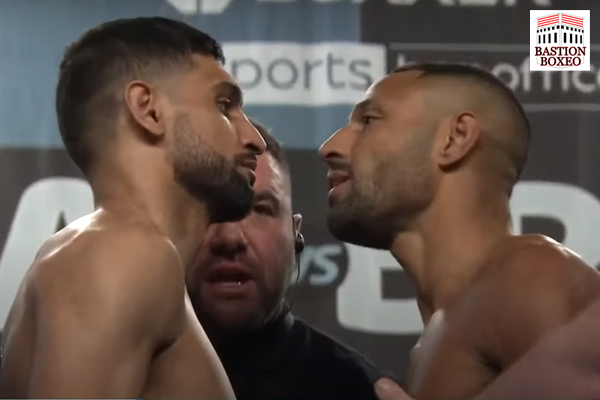Cuando parecía que Amir Khan no podía ser más patético, se confirma positivo en control antidopaje. Se necesita un cambio
Daniel Pi
@BastionBoxeo
Aunque muchos boxeadores, entrenadores, promotores, mánagers y comentaristas prefieren seguir fingiendo que el dopaje no existe, en algunos casos porque ellos mismos están implicados en el dopaje de una u otra manera, una vez tras otra se confirman más casos de boxeadores de renombre con positivos en control antidopaje. El último de ellos ha sido el excampeón mundial Amir Khan, que se dopó con ostarina para su último combate, el que disputó ante su archirival Kell Brook.
Si bien algunos piensan que los únicos boxeadores dopados son aquellos que rinden a un nivel monstruosamente alto, lo cierto es que esto no es así, sino que hay púgiles con niveles muy bajos, jornaleros y boxeadores con rendimientos tan malos como el que tuvo Khan ante Brook que también se dopan; lo único que cambia es que quienes logran mayores objetivos saben ejecutar mejor sus ciclos, compran sustancias más caras y efectivas o simplemente tienen un mejor nivel de base.
En otras palabras, aunque un jornalero dopado puede anotarse un triunfo inesperado ante un púgil con aspiraciones, o un boxeador mediocre dopado puede conseguir un rendimiento al nivel del top 15, y así sucesivamente, hay un techo hasta el que la mejora ilegal puede llegar: las sustancias dopantes, pese a la amplísima variedad de inmorales ventajas que pueden ofrecer, no pueden compensar la falta de inteligencia, de valentía, de dedicación, de garra, de talento natural, de habilidad, etc. que algunos boxeadores tienen y otros no.
En el caso concreto de Khan, aunque es verdad que durante su preparación para medirse a Brook, campamento de entrenamiento que realizó ayudado por Terence Crawford, mejoró mucho su físico y su definición muscular respecto a anteriores pugnas, en las que presentaba un aspecto poco atlético, la ostarina no puede ayudarle a lidiar con su falta de dureza mental bajo fuego, con su mala reacción ante los golpes de poder y con su constante toma de decisiones equivocadas dentro y fuera del ring, entre otras cosas. Pero esto no quiere decir que el efecto de las sustancias dopantes no sea importante, como algunos quieren hacer creer a la gente.
Tras este positivo, Khan, que anunció su retiro tras su derrota ante Brook (es curioso que este positivo se haya producido ante un púgil que también ha recibido acusaciones de dopaje en el pasado), todavía empeora más su mala imagen, a la cual ha dado forma con una total falta de realismo respecto a su posición en el boxeo, a una conducta fuera del ring que ha ido desde lo muy reprochable hasta los brotes paranoides, a una selección de retos completamente dispar (desde peleas a medida a encuentros que le quedaban grandísimos), etc.
Por otra parte este caso hace necesario destacar dos cosas más. Primeramente, aunque es verdad que últimamente se están produciendo bastantes positivos de boxeadores británicos, lo que resulta muy preocupante, es justo admitir que por lo menos cuando VADA falla, los tests de UKAD están atrapando a gente. Esto, en cambio, no se puede decir de los controles antidopaje de la absoluta mayoría de comisiones boxísticas del mundo, que son un completo coladero para tramposos, que pueden estar seguros de que nunca les atraparán o que si lo hacen los oficiales mirarán para otro lado siempre.
El otro punto a destacar, es que el sistema de investigación y sanciones por dopaje en Reino Unido, al igual que en el resto del mundo, necesita cambiar. El positivo de Amir Khan no se ha sabido hasta más de un año después de que se produjese, lo que indica que si el púgil hubiese querido boxear durante este tiempo seguramente habría podido hacerlo… Las comisiones de todo el mundo necesitan hacer públicos (no usando a periodistas amigos) los positivos en control antidopaje en cuanto se tengan, se tienen que establecer medidas cautelares aceptadas por todas ellas, se tienen que compartir los datos para no crear vacíos absurdos y se tiene que elaborar un sistema de sanciones justo y uniforme.
Con todo, hasta que alguien con poder decida que esto va a llevarse a cabo de una u otra manera, la lucha contra el dopaje seguirá reduciéndose a limitadísimos éxitos aislados contra púgiles despistados (o totalmente tontos), mientras que boxeadores como Conor Benn y promotores como Eddie Hearn podrán proyectar evadir sus responsabilidades organizando sus combates en Emiratos Árabes o Arabia Saudí o cualquier otro país que da más valor al dinero que a los derechos humanos.

When it seemed that Amir Khan could not be more pathetic, he tests positive in doping test. A change is needed in boxing
Daniel Pi
@BastionBoxing
Although many boxers, trainers, promoters, managers and commentators prefer to continue pretending that doping does not exist, in some cases because they themselves are implicated in doping in one way or another, time after time more cases of high-profile boxers with positive anti-doping tests are confirmed. The last of them has been the former world champion Amir Khan, who took ostarine for his last fight, the one he fought against his archrival Kell Brook.
Although some think that the only doped boxers are those who perform at a monstrously high level, the truth is that this is not the case, as there are boxers with very low levels, journeymen and fighters with performances as bad as the one Khan had against Brook who also dope; the only thing that changes is that those who achieve higher goals know how to execute their cycles better, buy more expensive and effective substances or simply have a better base level.
In other words, while a doped journeyman may score an unexpected win against a boxer with aspirations, or a doped mediocre boxer may perform at a top 15 level, and so on, there is a ceiling to which illegal performance enhancing can arrive: doping substances, despite the wide variety of immoral advantages that they can offer, cannot compensate for the lack of intelligence, courage, dedication, grit, natural talent, ability, etc. that some boxers have and others don’t.
In the specific case of Khan, although it is true that during his preparation to face Brook, a training camp in which he was helped by Terence Crawford, his physique and muscle definition greatly improved compared to previous fights, in which he presented an unathletic appearance, ostarine can’t help him deal with his lack of mental toughness under fire, his poor reaction to power shots and his tendency to constantly make the wrong choice in and out of the ring, among other things. But this does not mean that the effect of doping substances is not important, as some want people to believe.
After this positive, Khan, who announced his retirement after his defeat against Brook (it is curious that this positive took place against a boxer who has also received doping accusations in the past), worsens his image much more after his total lack of realism regarding his position in boxing, his behavior outside the ring (that has ranged from the highly reprehensible to the paranoid outbursts), his completely disparate selection of challenges (from tailor-made fights to matches that were way too difficult for him), etc.
On the other hand, this case makes it necessary to highlight two more things. Firstly, while it is true that there have been quite a few positives from British boxers lately, which is very worrying, it is fair to admit that at least when VADA fails, the UKAD tests are catching cheaters. This cannot be said of the anti-doping controls of the absolute majority of boxing commissions in the world, which are a completely useless and cheaters can be sure that they will never be caught, or that if they are, the officials will turn a blind eye.
The other point to highlight is that the system of investigation and punishment for doping in the United Kingdom, as in the rest of the world, needs to change. Amir Khan’s positive has not been known until more than a year after it occurred, which indicates that if the fighter had wanted to box during this time, he surely could have done so… Commissions around the world need to make public (not using journalist friends) the positive anti-doping tests as soon as they are obtained, precautionary measures accepted by all of them must be established, data must be shared so as not to create absurd gaps and a fair and uniform system of punishments must be developed.
However, until someone with power decides that this is going to be carried out one way or another, the fight against doping will continue to be reduced to very limited isolated successes against clueless (or totally stupid) fighters, while boxers like Conor Benn and promoters like Eddie Hearn will be able to plan evading their responsibilities by organizing their fights in the United Arab Emirates, Saudi Arabia or any other country in which money is more important than human rights.










